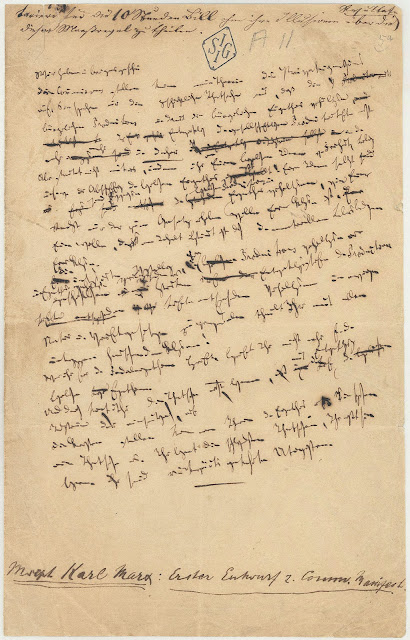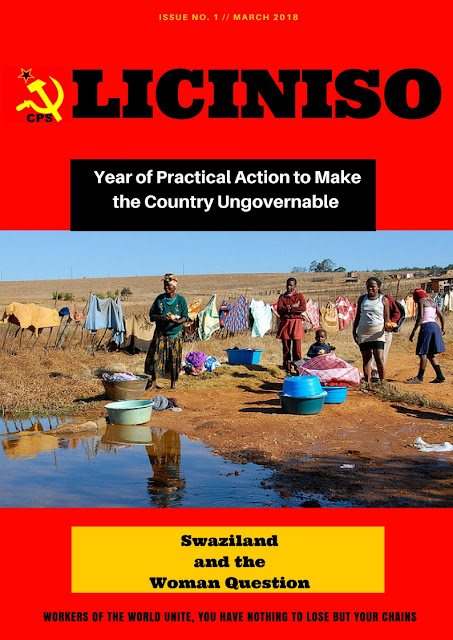By
Ian Beddowes
The
publication of the Manifesto of the
Communist Party in 1848 marked the beginning of the modern revolutionary
epoch of which we are still a part. The tiny group which formed the Communist
League in 1847 is now a huge movement with millions of members and supporters
and with organisation of some sort in nearly every country of the world.
Millions more who would not profess to be called communists are nevertheless
profoundly influenced by that body of opinion now known as Scientific Socialism
or Marxism-Leninism. That theory first launched itself into the world through
the publication of the Manifesto of the
Communist Party.
Proletarian
Revolution, National Democratic Revolution, the building of socialist economies
or of intermediate economies leading to socialism are no longer matters of
theory and speculation — they are now practical matters around which there is a
wealth of experience both positive and negative. The movement has had its
triumphs: the Great October Socialist Revolution in Russia in 1917, the victory
over fascism in 1945, the triumph of the Communist Party of China in 1949, the
victory of the Fidelistas in Cuba in 1959 and the victory of the Vietnamese
people over US imperialism in 1975.
The
proletarian revolution has had its failures and tragedies: the slaughter of
Indonesian Communists in 1965 and the European Counter-Revolution of the late
1980’s leading to the destruction of the Soviet Union, Yugoslavia and
Czechoslovakia.
Despite
the serious setbacks, we have since experienced the rejection of US domination
by Latin America starting with the election of President Hugo Chavez in
Venezuela in 1999 and continuing with the election of progressive governments
aligned to the Republic of Cuba and supported by their local Communist Parties
throughout that continent. Most importantly, these governments have boosted
their economies and considerably reduced poverty. Monopoly Capitalism has
meanwhile sunk into its most severe crisis since the 1930’s and has no obvious
way in which it can solve that crisis.
In
Africa, it has been increasingly clear that a flag, a national anthem and a
black president in each country will not resolve the problems of poverty and
inequality. The imperialists in their greed for the raw materials of Africa
have, to their delight, discovered African élites that are not only easily
corruptible but are eager to be corrupted.
In a few cases, like
Zimbabwe, there has been a difference of opinion between the corrupt
neo-colonialists and the corrupt indigenous ‘entrepreneurs’ over the division
of the plundered wealth. It has become painfully obvious that those who talk
about Marxism as an imported un-African ideology have been proved to be nothing
but romantic windbags remote from the daily life of the African majority — of
which they claim to be part by virtue of their skin colour.
 |
| The cover of the 1848
Communist Manifesto original in German |
W.E.B
Du Bois, the founder of pan-Africanism and Kwame Nkrumah, its greatest
practitioner never hid their debt to the theory of Scientific Socialism. Moses Kotane
in southern Africa led the process which indigenised the ideology of Karl Marx
and Frederick Engels and their great successor, Vladimir Lenin, welding it into
a weapon that would successfully direct the forces which would defeat apartheid
in South Africa and profoundly influence the liberation movements in the
surrounding countries. The liberation of Africa, then, starts with the Manifesto of the Communist Party.
“The
history of all hitherto existing society is a history of class struggles”,
correctly asserted the Communist
Manifesto. Some people have wrongly presented Swaziland as an exception to
this fact, claiming that the people of Swaziland are one homogenous nation and
thus do not need “foreign” ideas to divide them. The fact of the matter is that
the history of Swaziland is, like the rest of Africa, a history of class
struggles. The people, some 77% of which are resident in the rural areas, are
subjected to the cruel rule of chiefs, representing the absolute monarch. Many
lack access to clean water, electricity and quality education.
On
the hand, the exploitation of the workers in the urban industries is open for
all to see. The absolute monarch carries a large whip in the form of its
security forces to ensure the deepening of exploitation of workers mainly by international
capital and oppression of the rural population. The political and economic interests
of the monarch, on the one hand, and capitalists, on the other, are not the
same as those of the workers and rural poor. The products of workers’ labour
are shared between the monarch and the capitalists. As such, the 2018
tinkhundla elections are nothing but a ploy by the ruling class to maintain its
grip on power. They are not about the workers and rural poor. Thus, it is
important that the workers and poor should not participate in these sham
elections and instead join the mass democratic movement in fighting to
overthrow the oppressive tinkhundla regime.
Marx
and Engels had both been philosophy students in the 1830’s studying the work of
the German philosopher G.W.F. Hegel, whose brilliant work on dialectics had
been updated and revolutionized by his successor, Ludwig Feuerbach. Radicalized
by both the growing bourgeois revolutionary movements sweeping Europe and the
misery caused by the Industrial Revolution to the growing industrial
proletariat, they independently arrived at a similar viewpoint.
By
1844, Marx had already demonstrated his ability as a revolutionary journalist;
more importantly he had, at the age of 26, already developed the fundamentals
of his theory in his Economic and
Philosophical Manuscripts which, however, were only to be published in the
20th Century. Engels, during the course of 1844 wrote his well-documented and
graphically descriptive The Condition of
the Working Class in England which was published the following year.
Marx
and Engels met for the first time in Paris in September 1844 creating a
partnership that was destined to change the course of world history and was to
continue even after the death of Marx in 1883 when Engels edited and completed
Volumes II and III of Marx’s major lifework, Capital.
In
1845, Marx and Engels collaborated for the first time with their work The Holy Family. The book created a
sensation when it was published. In the same year they also wrote jointly The German Ideology, a brilliant early statement of their ideas which was only
published after their deaths.
The League of the
Just, a secret society founded in Paris in 1836 by German workers and
craftsmen, had spread around Europe and was becoming increasingly international
in membership and outlook. The leaders of the League, Karl Schapper, Joseph
Moll and Heinrich Bauer, who all lived in London asked Marx and Engels for
their help in re-organizing the League and drafting its new programme. When
Marx and Engels were convinced that the leaders of the League of the Just were
ready to accept the principles of scientific communism as its programme, they
joined the League late in January 1847. In June 1847, at its London congress,
the ‘League of the Just’ became the ‘Communist League’. Its hazy slogan “All
Men are Brothers” was replaced by the militant internationalist slogan “Workers
of All Countries Unite!”
 |
Karl Marx
(1818-1883)
|
Thus
this congress became the First Congress of the Communist League. The aims of
the Communist League were the overthrow of the bourgeoisie, the abolition of
the old bourgeois society based on class antagonisms, and the establishment of
a new society in which there would be neither classes nor private property.
Marx
was unable to reach London for the Congress: Engels attended and drafted its
first programme, A Communist Confession
of Faith. The form of a ‘revolutionary catechism’ was commonly used by secret
societies and organizations of workers and craftsmen at the time. The draft was
accepted by the Congress on its final day, 9 June 1947, and signed by the
League Secretary, Wilhelm Wolff and its President, Karl Schapper. Following a
Communist League meeting in October 1847, Engels was asked to draw up a revised
programme: this he did under the title Principles
of Communism. By this time it had already been decided to call a Second
Congress. In the Letter from Engels to
Marx (24 November 1847), Engels writes:
I
think we would do best to abandon the catechetical form and call the thing
Communist Manifesto. Since a certain amount of history has to be narrated in
it, the form hitherto adopted is quite unsuitable.
 |
Frederick Engels
(1820-1895)
|
The Second Congress of the Communist League was convened from 29
November – 8 December 1847 in London. The Congress charged Marx and Engels with
the task of writing a new programme in manifesto form. They worked together
from the end of Congress until the end of December after which, having other commitments,
Engels left Marx to continue on his own. Marx continued through the whole of
January 1848; the manuscript was sent to London to be printed in the German
Workers’ Educational Society’s print shop owned by a German emigrant J.E.
Burghard, a member of the Communist League. The first edition appeared in
German at the end of February 1848. The Communist League remained in existence
until 1852, becoming the predecessor of the International Working Men’s
Association (First International) founded in 1864.
In his Preface to the English Edition of 1888, Engels explains why their
work was called the Communist Manifesto
and not the Socialist Manifesto:
...when
it was written, we could not have called it a socialist manifesto. By
Socialists, in 1847, were understood, on the one hand the adherents of the
various Utopian systems: Owenites in England, Fourierists in France, both of
them already reduced to the position of mere sects, and gradually dying out; on
the other hand, the most multifarious social quacks who, by all manner of
tinkering, professed to redress, without any danger to capital and profit, all
sorts of social grievances, in both cases men outside the working-class
movement, and looking rather to the ‘educated’ classes for support. Whatever
portion of the working class had become convinced of the insufficiency of mere
political revolutions, and had proclaimed the necessity of total social change,
called itself Communist. It was a crude, rough-hewn, purely instinctive sort of
communism; still, it touched the cardinal point and was powerful enough amongst
the working class to produce the Utopian communism of Cabet in France, and of
Weitling in Germany. Thus, in 1847, socialism was a middle-class movement,
communism a working-class movement. Socialism was, on the Continent at least,
‘respectable’; communism was the very opposite. And as our notion, from the
very beginning, was that “the emancipation of the workers must be the act of
the working class itself,” there could be no doubt as to which of the two names
we must take. Moreover, we have, ever since, been far from repudiating it.
 |
This is the only
surviving page from the first draft of the Manifesto, handwritten by Marx
|
The Communist Manifesto ends with the clarion call: “Workers of the
World, Unite!” For the freedom of the people of Swaziland to be free, they
therefore have to unite against the oppressors, for they have nothing to lose
but their chains!
Long
live the Communist Party! Long live the Manifesto of the Communist Party!
Ian
Patrick Beddowes is the National Commissar of the Zimbabwe Communist Party
*This article is adapted from an introduction to the Communist Manifesto written by Comrade Ian Beddowes under ZimCom
Publishers (2012).
·
Liciniso
















